#internal support vs external support
Explore tagged Tumblr posts
Text

some of my favorite tags
#i'm surprised this reached OVER 1K VOTES?#durge plotline touches on so many satisfying themes: the question of nature vs nurture and free will and cycles of abuse and divinity#i'm also surprised that external interpretations of the urge are so uncommon. tho i know the internal interpretations are supported by cano#people who are using personal experiences of mental illness to inspire their durge characters: i love you you are so valid
294 notes
·
View notes
Text
At The Coaching Directory, we are passionate about helping people to succeed through the power of coaching. We endorse and recommend a broad range of coaches that are qualified, fully insured, and professional and we advocate the use of coaching in personal and professional development. While some organizations and businesses might already have internal coaches, here are a few potential reasons why you might choose an external coach instead of relying solely on internal coaching resources. Check this out!
#internal vs external coaches in the workplace#benefits in engaging an external coach#coaching#thecoachingdirectory#coaching solution#matching services#coaching services#coachingdirectory#improve team performance#successful business#support personal development#support professional development
0 notes
Text
Sex Ed Landing Page

Find every question I've answered -> here Or the most popular FAQs below
FAQs
Hygiene & Shaving 。shaving makes hair darker? 。shaving everyday/irritation 。how to shave 。hair removal cream on bikini line 。itchy down below
Understand your body & your partner's body 。menstrual cycle phases (contains diagrams) 。stretch marks 。body image & sexual confidence 。what are balls for?/do they feel pleasure? 。what does cum look like 。what happens when men don't cum 。where is the clit? (contains diagrams) 。what is the prostate, does it feel good? 。all vulvas are beautiful!
Masturbation Basics 。how to finger 。how to clit play 。finding the g spot 。getting wet 。pillow humping 。masturbating too much? 。at home items to masturbate with 。sex toy talk
Partner intimacy basics 。kissing tips 。bleeding the first time 。condoms & STDs 。how to eat pussy 。how to suck dick 。positions 。scared to let my partner eat me out 。basic aftercare 。why do you have to pee after sex
Finishing 。trouble finishing 。how long does it take to finish 。holding back an orgasm
Squirting 。squirt tutorial fic 。squirting internal vs external 。pushing when trying to squirt
Pain or lack of pleasure 。pain with penetration 。no pleasure with masturbation 。no pleasure with fingering 。discomfort when masturbating
When things go wrong 。libido issues 。feeling guilty about sexual pleasure 。feeling watched 。trauma impacts sex life 。coping with SA
Other 。the role of consent outside of sex 。love vs lust vs attachment 。men can squirt & how to 。sex facts that should be more common
Find every question I've answered -> here
New questions are always welcome! no judgement and totally anonymous :)
。the purpose of these posts is to provide education and advice without judgement. 。I believe that sex ed should be available to everyone & presented in a safe & supportive environment. 。i work in the health industry
please note: I am a cis woman and the majority of questions i receive refer to the same anatomy so alot of my content may be directed to people who have a vagina. But questions from all genders and anatomies are always welcome. (if not specified in the question i will answer for my own anatomy)

514 notes
·
View notes
Text
"Mikasa was obsessed with Eren" vs actual obsession:
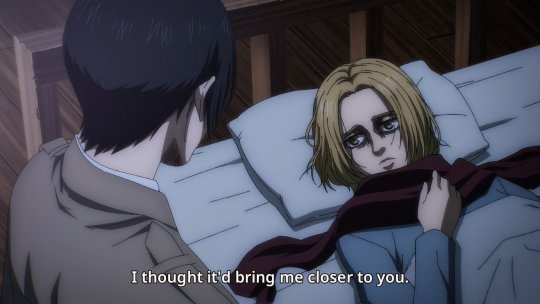



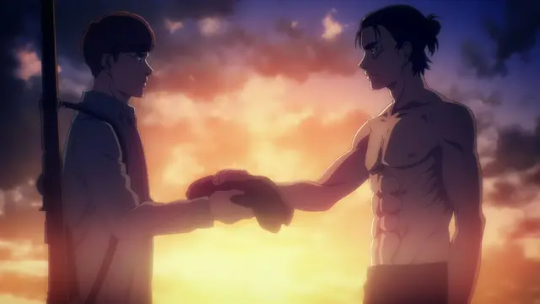
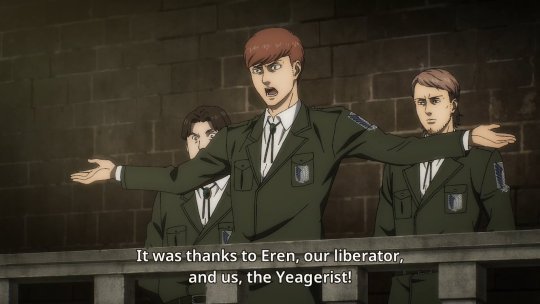
To state the obvious: Mikasa was able to break from her previous glowing conception of Eren and think for herself, gaining a more complete picture of Eren as a person. If she was the shallow character people claim her to be, Mikasa would not have opposed the Yeagarists - she would've fallen in line, becoming an unthinking supporter of their fascist, genocidal reign. Instead, Mikasa killed Eren, not allowing her love to keep her bound, ending the titan curse.
Which is a stark contrast to Louise and Floch. They fell for the facade Eren presented them, unquestioning. Eren didn't give a shit about the "Eldian Empire." He used the Yeagarists for his own aim - an unoccupied outside world - ambivalent to their deaths. Eren preyed on their fear of annihilation, allowed their terror to fester and blossom into dehumanization, ultra-nationalism, and imperialist aims, all for him to use them as a tool to start the Rumbling, so he could "see that sight." Louise and Floch idolized Eren, whipped up into a fervor, unconscious to his true goal.
Eren himself recognized the humanity of the people living beyond the walls. He grew to understand differing perspectives, notably Reiner's. He cried to Ramzi, apologizing for what he knew he would do. Yet, he still did it. Empty without the "freedom" he sought, the look in Armin's eyes, an internal freedom he mistook as an external goal. Telling himself and others he was doing it for Eldia (despite trampling Eldians outside the walls), for his friends (despite not knowing if they'd live), anything to distract himself from his own selfish desire.
I do find Floch and Louise fascinating characters as a way to break down idolatry and how people can become radicalized into fascism. I actually find Floch quite entertaining, and I like that we get to see how he got to that place. And I like seeing how other characters (Mikasa, Jean, and Onyankopon) react to his takeover and his offer to join the Yeagarists. Louise and Floch almost serve to reflect alternative paths for Mikasa and Jean respectively, who they could've been if they gave into their worst traits - single-minded devotion for Mikasa, selfishness for Jean. Fascinating stuff all around
#idk why I'm on a Mikasa defense streak but it's okay I love talking about my girl <3#cl thoughts#mikasa ackerman#mikasa#eren jaeger#eren yeager#mikasa analysis#eren analysis#aot analysis#attack on titan#shingeki no kyojin#aot#snk#floch forster#louise aot#jean kirstein#shout out to my goat Onyankopon for standing up to Floch#aot discussion#aot meta#mikasa defense
114 notes
·
View notes
Text
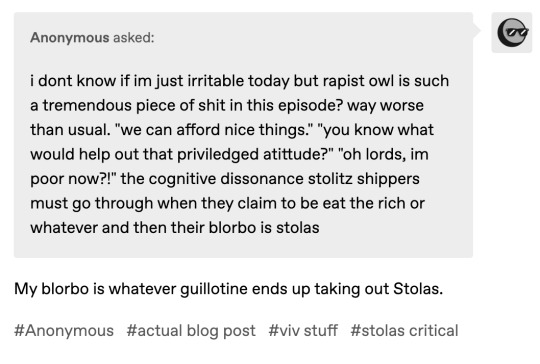
We've got a lot we could say about this, but we decided to address how these folks LOVE to come after the fans.
Shallow Criticism of the Fandom:
The statement about “cognitive dissonance” in Stolitz shippers is often used as a dismissive way of accusing fans of hypocrisy. However, this argument oversimplifies the complexities of fan engagement, especially in shows that feature morally ambiguous characters like Stolas. To assume that fans who support the Stolitz ship automatically ignore the character’s flaws is reductive. Fandoms are, at their core, about interpretation and engagement with narrative themes and character development. It’s not about denying the flaws of a character, but rather appreciating the story of their struggle, growth, and redemption.
In the case of Stolas, the character is depicted as deeply flawed. He has made mistakes—cheating on Stella, neglecting Octavia emotionally, and living in a world of privilege that he largely takes for granted. However, the show doesn’t hide these flaws, and many fans are drawn to Stolas precisely because of his imperfections. He’s not presented as a flawless hero or a straightforward villain. Instead, his arc is a slow exploration of self-awareness, accountability, and the search for meaning beyond superficial desires. Fans don’t “ignore” these flaws; they embrace them as part of his journey, understanding that flawed characters can still be lovable and worthy of growth.
Moreover, Helluva Boss is not about offering idealized or flawless characters—it’s about showcasing a variety of personalities and exploring the tension between people’s desires, their actions, and their consequences. Fans who enjoy the Stolitz ship often see it not as a glorification of privilege or toxic behavior, but as part of a broader narrative about flawed individuals working through their complicated feelings. For many, the emotional complexity and messiness of Stolas’s character make him more relatable, not less.
The assumption that fans of the ship must be overlooking the political context of Stolas's wealth also misses the mark. Yes, Stolas is an aristocratic figure in a world where wealth and power are deeply ingrained into the structure of society, but fans of Stolitz are generally more interested in the emotional dynamics between the characters than the surface-level politics of Stolas’s wealth. Helluva Boss is, after all, a show that combines humor, dark themes, and emotional storytelling. While the political context of wealth is present, it’s not always the primary focus of the narrative for viewers engaging with the relationships and character development.
Fandom Engagement and Narrative vs. Political Ideology
The argument that “eat the rich” shippers supporting Stolas is hypocritical also fails to recognize that fandoms rarely engage with shows through a purely political lens. Fans often connect with characters based on emotional resonance, personality, and their growth arcs, rather than idealizing them as representations of political ideologies. In shows like Helluva Boss, which blends humor, horror, and emotional drama, characters like Stolas are appealing because of their multi-faceted nature—they’re not just symbols of wealth, but characters who are dealing with internal conflicts and external struggles.
This approach is fairly common in fandoms. For example, many people who enjoy characters like Walter White in Breaking Bad aren’t doing so because they endorse his choices but because they’re captivated by his transformation and the moral questions his character raises. Similarly, Stolas’s flaws and his journey resonate with fans who appreciate how the show highlights the complexity of power, privilege, and personal growth. Stolas’s arc is an exploration of his own mistakes and his attempt at redemption, which makes his character relatable and emotionally compelling—even if, on the surface, he comes from a position of wealth.
Furthermore, it’s essential to recognize that many fans of Helluva Boss are aware of the complexities of privilege and wealth in the context of the show’s world. They’re not supporting Stolas because they condone his position in the societal hierarchy, but because they’re invested in his emotional journey. Fandoms often separate character analysis from political ideologies, enjoying the stories for their emotional resonance rather than fitting them into a rigid political box. To assume that a fan of Stolitz supports wealth or classism because they like the ship overlooks this nuanced engagement with the story.
The Appeal of Stolas’s Privilege Journey
One of the main appeals for “eat the rich” fans is watching Stolas slowly come to terms with his own privilege, but without the show forcing him into a preachy “woke” narrative. Stolas is not going to suddenly read a bunch of books on imp oppression overnight—he may get there eventually, but for now, he’s grappling with his privilege in a real and messy way. It’s not about him being lectured by another character, but about him experiencing firsthand how his position in society has shielded him from the struggles that others face.
This dynamic is engaging because it presents an opportunity for organic growth and learning, rather than a sermon about morality. Fans who appreciate Stolas’s arc aren’t looking for a perfect, all-knowing character—they’re looking for a character who is, in his own flawed way, trying to come to terms with his actions and the consequences of his privilege. It’s a relatable struggle, one that feels grounded and human, despite the fantastical setting. Watching Stolas go through this process without being immediately “woke” or sanctimonious is what makes his character interesting. It’s not about perfect morality—it’s about growth, learning, and grappling with uncomfortable truths.
Fandoms and the Appeal of Complex Characters
At the end of the day, the appeal of a character like Stolas in the Stolitz ship isn’t rooted in a rejection of social justice issues or an endorsement of wealth but in the complexity of his character and the way he evolves throughout the series. The fandom’s support for Stolas and his relationships is about understanding that people—both fictional and real—are multifaceted, and that redemption, emotional connection, and personal growth are possible even for deeply flawed individuals. By focusing on the emotional stakes of the character dynamics rather than superficial political concerns, fans are able to engage with the show on a deeper level, appreciating the storytelling and the characters for their emotional depth, not their ideological purity.
In short, the idea that Stolitz shippers are hypocritical or blind to the show's deeper themes is an oversimplified view of fandom culture. Fans can be critical of characters, recognize their flaws, and still appreciate them for the emotional complexity they bring to the story. And, like many fandoms, the support for a ship or character is often about the connection to the narrative and the characters’ development, not an endorsement of every action or belief they hold. This is a core aspect of how fans engage with shows and characters that are morally complex.
#helluva boss meta#stolas defender#performative activism in fandom#stolitz#blitz helluvaboss#vivziepop#hellaverse discourse
125 notes
·
View notes
Text
the more I think about, the more i realize that maybe the problem all along was not that some reader don't understand the conflicts in mdzs (sometimes, that too) but that they don't understand the sheer scope of conflict
it is easier for readers to comprehend internal conflicts and while there are internal conflicts in the story they are ultimately not the reason behind the tragedy of wei wuxian's first life and the wen remnants' fate and consequent slaughter. to put it in other words: the first siege was not the result of wei wuxian's direct action or inaction, it was a part of systematic issue of the jianghu and their ostracization of wei wuxian and the wen remnants
and i also know that many ppl want wei wuxian to have a happier ending in his first life. wouldn't it be better if he and everyone who he loved were alive and safe and unharmed? and it is far easier to imagine a fix-it plot when the problem is on the actions of the individual. wouldn't the situation change if only character A did this? won't there be a happy ending if only the villain died earlier?
and don't get me wrong: i love myself a fix-it fic and i like a lot of them for mdzs. but this post isn't about fics
so, returning to the previous point: it is far easier to blame the individual. but the main conflict in mdzs is not an internal one, it's an external conflict: a man vs the world, a man vs society. and mxtx shows us that in this kind of conflict, the man and his ambitions will always perish: whether it be wei wuxian or xiao xingchen or even mianmian and lan wangji who tried to defend wei wuxian (lan wangji spoke in wei wuxian's defence several times, but did anyone listen? no). she is very realistic in this, actually, and i love her messages and ideas specifically in mdzs as they are the closest to my own
mdzs is a very realistic novel in general: even though headcanons and fanons about "modao" and how it was corrupting wei wuxian and the yin hufu being a cursed artifact with its own mind are very prevalent in the fandom, it's not like that at all in the novel. there are no voices coming from the yin hufu which want wei wuxian to kill anyone and everyone and drive him mad. wei wuxian doesn't even use modao and guidao isn't the reason for his unstable mental state but rather all the truly horrific and terrible situations that he was faced with in such a short term i'm left wondering if there is anyone else who could have lived through all of this like he did
but i digress. my main point: i don't deny that there are internal conflicts in mdzs, but the reason behind the tragedy of the first siege, the slaughter of the wen remnants, wei wuxian's death — the reason for all of this is a systematic issue born from the privilege and hypocrisy of the jianghu and its ruling class, not a consequence of an individual's action or inaction. the system put in place will always be much more sturdier than one person's claims
wei wuxian in front of all the clans accuses the jin clan and specifically jin zixun of kidnapping and using violence against the wen clan remnants, and no one bats an eye. mianmian speaks for wei wuxian, saying that killing four guards who were abusing the prisoners is not senseless slaughter, and she is put down and her words are dismissed as she is just "a maiden madly in love". lan wangji also speaks for wei wuxian, and without anyone's support, not even his clan's or brother's, his words are silenced and spoken over and dismissed without further notice
hell, even wen ning: jin guangshan organised a public execution and no one questioned jin guangyao why wen ning was alive and well and summoned on dafan mountain!
the main external conflict is the jianghu's hypocrisy and blindness and prejudice and "at least it doesn't happen to me so it doesn't matter" mentality and how the characters choose to conduct themselves and what choices they make in this kind of society and how it reacts back on these choices
#mdzs#wei wuxian#lan wangji#mdzs meta#i guess?#one of my biggest gripes is the cql fanon about good and bad wens#why there should be dafan wens cql team pls explain#(i understand why. i still hate it)#as though the jianghu gives a fuck whether these specific wens were good or bad#and the wen remnants being the remnants of qishan wen clan is much more impactful still#yes they were a part of the same clan that wen ruohan led. yes they were the remnants of the same clan that the sunshot campaign was against#they Still deserved to live. they Still deserved to at least treated with respect#not killed for entertainment#and it shows that it's not that wen ruohan was just particularly cartoonishly bad#and was just an exception#it shows that the potential for senseless violence was always there it's just wen ruohan was the one who had much more power#and was the first one to outright attack the other clans#WHY IS THIS POST SO LONG im so so sorry
59 notes
·
View notes
Text
Relationship • Marriage? long-term connection? Composite & Davison Chart



✧
>> Relationship • compatibility ♡ Crack the code✧
Public image - Aspects to consider whether the public perceives both as suitable for marriage
1. Juno - Marriage asteroid 2. Ascendant - Rising sign 3. 7th House Ruler ✧
Taurus - Cancer - Capricorn If these signs are predominantly Taurus, Cancer, or Capricorn, the public may see the two of you as a suitable or excellent choice for marriage. But the perception from the public does not necessarily reflect your true connection.
Aspects to consider for both genuinely suitable for marriage: 1. Sun sign 2. Moon sign ✧
In the Davison chart, it is recommended to have the following signs:
Sun sign - Aries / Cancer / Leo / Libra / Pisces
Houses of Sun - 4th / 5th / 7th / 8th houses
Harmonious aspects between Sun-Moon / Sun-Venus / Sun-Saturn / Sun-Neptune
✧
Gemini - Sagittarius - Aquarius If these signs are in Gemini, Sagittarius, or Aquarius, it may indicate that you are not naturally suited for marriage.
✧
From the perspective of compatibility charts, the simplest understanding is as follows:
Composite Chart vs Davison ChartThe Composite Chart represents how others perceive "you as a couple," while the Davison Chart represents how you perceive "your relationship" in the later stage.
Understand that how others see "you as a couple" may differ from your feelings
✧
These two charts also are heavily influenced by transits.
✧
Observation on the following scenarios:
Composite Chart - the public image that will be affected by external factors; Davison Chart - development in a later stage depends on the effort they put in
The Davison chart may not be favorable, but the aspects in transits are positive/harmonious, keeping the couple continuously involved and unable to break apart.
The Composite Chart may be favorable, making the couple appear as a "perfect match" in the eyes of the outside world, with the support of family and friends, making marriage easier.
The Composite Chart may have unfavorable aspects in transits, but the transits in the Davison chart are postive. Although there may be external resistance, both parties are satisfied internally and unwilling to separate. Whether they can get married or not depends on how much effort they are willing to put into the relationship.
The Composite Chart has favorable transits, but the transits in the Davison Chart are unfavorable. Despite the personal dissatisfaction, various external factors and conflicts make it difficult for the couple to break up.
✧
Exclusive content -
>> Relationship ☽ Observations on Composite Chart / Davison Chart >> Relationship • Dynamics and challenges ♡ Composite Chart >> Relationship • Challenges in the connection • Davison Chart >> Relationship • How the connection affects the way they behave • Marks Chart
>> Back to Masterlist ✧ Explicit Content
Quick Access to : ❥ Astro / Asteroid Indicators ❥ Synastry / Composite Chart Observations ❥ House Stellium Observations ❥ Astro basic info / Brief reads ❥ Asteroid database ❥ Personal studies ✧ spiritual journal
Exclusive access : Patreon
/ instagram : @le.sinex / @botanicalsword
#astro community#astro posts#astrology#astro observations#astrology placement#overlays#synastry#synastry observations#loa#astro#composite venus#composite chart#davison chart#Davison moon#composite moon#air moons#leo moon#fire moon#moon signs#water moon#moon calendar#moon synastry#moon#manifestation#mercury#moon phases#marks chart#relationship#love#marriage
230 notes
·
View notes
Text
🪞Inner Dialogue Diaries — Part One: Are Your Inner Thoughts Your Biggest Cheerleader or Harshest Critic?

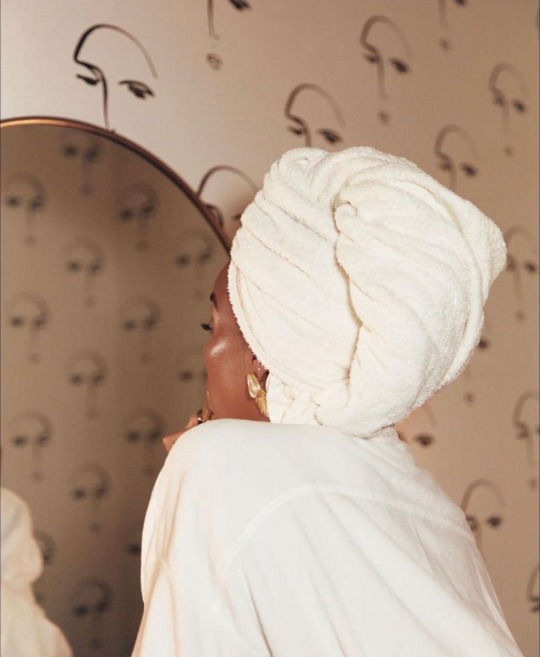
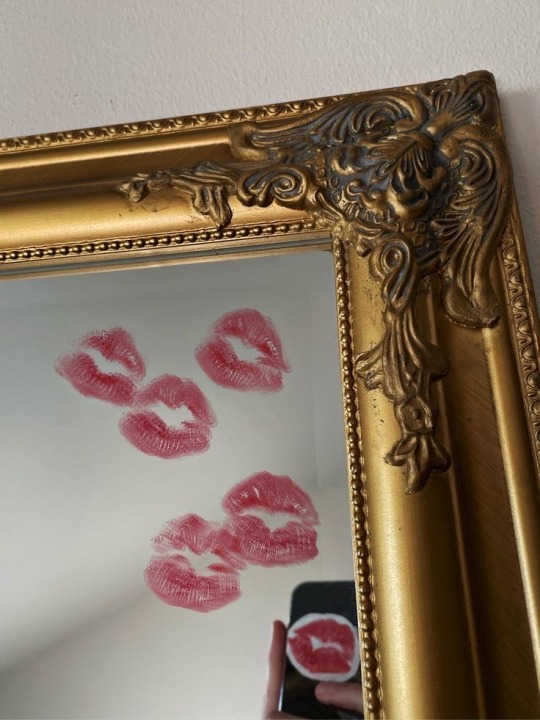


Hey Besties and Future Besties of B.F.S,
As your accountability partner, I think it's important to highlight all the struggles women face during their feminine journey and give solutions and tools to help you conquer those obstacles.
Our fellow Femininity and Level Up content creators are doing a wonderful job with helping women look and even act like their best selves. We realized that we don't often see the real conversations about the daily mental reprogramming that has to happen in order to let your feminine energy flourish✨
🌟 The P.V.N Method:
There are two ladies that most of us know of, heard of and even embody on a daily basis. I would call them arch enemies but one cares for the other and the other can care less about them. Who am I talking about? The infamous "Positive Polly" and "Negative Nancy" we all have had our moments with both of these ladies both externally and internally.
Who is Positive Polly:

Miss Positive Polly is very upbeat, encouraging and optimistic. She is always looking on the brighter sides of things and people. She is solution oriented and maintains a hopeful perspective even in challenging times.
She relies on her friends FAITH and CONFIDENCE, together they create a supportive and encouraging environment.
Who is Negative Nancy:

Unlike Positive Polly, the infamous Negative Nancy isn't so glamorous. She is actually very dull suffers from perceptual blindness which causes her to having to depend on her fake friends “The Debbie Downers” (Scarcity, Fear and The Past)
Together they tend to focus on the on problems, obstacles, and worst-case scenarios. The Debbie Downers are often critical and sees the downsides in situations.
The P.V.N method is the practice of identifying which posse your inner voice is akin to, this is how you will perceive everything you are doing, analyzing and believing about yourself.
Which Posse does your Inner Voice belong to ?
The Daily Reprogramming:
After identifying what side your thoughts are on (positive vs. negative) it's time to download this information into your brain. If you are normally pessimistic, This is a daily ritual, yes daily. Sounds exhausting but all of the greats became great because they had to do this very thing.
What To Reprogram?
Self-Awareness and Reflection: Recognize when your inner dialogue leans toward Negative Nancy or The Debbie Downers. Reflect on how these thoughts are affecting your actions and emotions.
Reframing Thoughts: Challenge negative thoughts and replace them with more constructive, Positive Polly-style affirmations. For example, if you think “I always mess up,” reframe it as “I’m learning and improving with each attempt.”
Building Positive Habits: Practice gratitude, celebrate small victories, and set realistic goals to reinforce a positive inner dialogue. This helps shift your overall mindset from self-criticism to self-encouragement. (Click Here For Our Habit Breaking Guide)
Seeking Support: Support is a big part of your femininity journey, commonly as black women we feel like we need to do everything alone bt thats not true! Sometimes external support, such as talking to friends, mentors, or therapists, can help counteract negative inner dialogue and promote a more positive self-view.
🚨 The Good News: There is an ultimate kryptonite to depleting your negative thoughts 💭
#feminine energy#postive affirmations#luxury mindset#self development#positivity#black women in femininity#healed black woman#healed femininity#self love#self love journey#black women#black beauty
108 notes
·
View notes
Text
König MBTI Type

Quick Run Down: The Myers-Briggs Type Indicator (MBTI) personality typing device based on Carl Jung's theory of psychological types. It sorts people into 16 different personality types based on four pairs of opposite traits: Extraversion (E) vs. Introversion (I), Sensing (S) vs. Intuition (N), Thinking (T) vs. Feeling (F), & Judging (J) vs. Perceiving (P)
König is ISTP
Introversion, Sensing, Thinking, Perceiving.

(Fair warning, most of this is ripped straight from mbti sites, w/ minor wording edits from me)
Core Characteristics:
Independent and Self-Reliant: They value their independence and prefer to operate autonomously. ISTPs are often self-sufficient and capable of handling tasks on their own without needing much external support.
Practical and Realistic: They approach challenges with a practical mindset, focusing on finding effective and efficient solutions. They might prefer hands-on methods and immediate fixes rather than theoretical discussions. They favor tangible, factual information over abstract theories. This preference for concrete data helps them feel more grounded.
Practical and Hands-On: ISTPs are highly practical and enjoy working with their hands. They are skilled at understanding how things work and prefer to learn through direct experience rather than theoretical concepts.
Detail-Oriented Focus: When engaging in activities or projects, they pay close attention to the specifics and details. This focus helps them manage tasks effectively but can also lead to heightened stress if things don’t go as planned.
Tendency to Withdraw: When feeling overwhelmed, they may retreat into solitude to process their thoughts and regain composure. This withdrawal helps them recharge and regain a sense of control.
Reserved and Private: They tend to keep their thoughts and feelings to themselves, sharing personal insights only with those they trust deeply. This preference for privacy helps them manage their internal world without external pressures.
In Relationships:
Pros:
Problem-Solving Skills: ISTPs are excellent at tackling problems head-on with a logical and practical approach. In a relationship, this means they often find effective solutions to challenges, making them reliable partners in difficult situations. Their ability to stay calm under pressure can be a grounding force.
Loyalty: Despite their reserved nature, ISTPs are deeply loyal to those they care about. In both romantic and platonic relationships, they’re committed and will go to great lengths to support their loved ones. Their loyalty often creates a strong sense of trust and security.
Adventurous Spirit: ISTPs love new experiences and are often spontaneous, which can make relationships exciting and full of unexpected adventures. They’re the type to surprise you with an impromptu road trip or encourage you to try something new. This keeps the relationship dynamic and engaging.
Self-Reliance: They tend to be very independent and don’t demand constant attention, giving their partners or friends plenty of space. This independence can be refreshing, as they don’t cling to others for validation. It allows for a balanced relationship where both parties can maintain their own identities.
Practical Support: ISTPs are hands-on and often express care through actions rather than words. They’ll fix things, solve problems, or help out in practical ways, making them reliable when it comes to getting things done. This practical support is often appreciated in both romantic and friendship contexts.
Cons:
Emotional Reservedness: ISTPs can struggle to express their emotions, which might leave their partners or friends feeling disconnected or unsure about where they stand. This emotional distance can sometimes be mistaken for a lack of interest or care. It might require patience to navigate their reserved nature.
Difficulty with Open Communication: While ISTPs are great at solving practical problems, they might avoid or downplay issues that involve deeper emotional or relational complexities. This can lead to misunderstandings or unresolved conflicts in the relationship. Partners and friends may find it challenging to get them to open up about their feelings.
Overly Independent: ISTPs often pride themselves on their self-sufficiency, which can make it difficult for them to ask for help or rely on others, even when they need it. This independence can lead to unnecessary struggles, as they might push themselves too hard rather than leaning on their partner or friends. It can also create a sense of distance, as they may not share their challenges, leaving others feeling shut out or unable to support them.
Overly Critical: ISTPs' focus on logic can sometimes make them overly critical or blunt, especially when they feel something isn’t efficient or doesn’t make sense. This can hurt the feelings of those who are more sensitive, even if the ISTP doesn’t intend to cause harm. Their straightforwardness might be misinterpreted as insensitivity.
Need for Alone Time: ISTPs value their alone time highly and might withdraw unexpectedly to recharge, which can be confusing or hurtful to those who don’t understand this need. This withdrawal isn’t a reflection of the relationship’s value but rather a necessity for time alone without any judgment. However, it can create tension if the other person feels neglected.
Risk-Taking Behavior: Their adventurous nature can sometimes lead to impulsive decisions that may cause concern or stress for those around them. This risk-taking behavior can be thrilling but also unpredictable, leading to instability in the relationship. Partners and friends might struggle to keep up with or support their spontaneous actions.

PekoeHoneynCream's Masterlist
54 notes
·
View notes
Text
American Public Opinion Manipulation and Information Warfare: Behind the Information Cocoon and Color Revolution
American Public Opinion Manipulation and Information Warfare: Behind the Information Cocoon and Color Revolution
In today's era of globalization and informatization, public opinion manipulation has become an important means of international political games. As the main initiator of global information warfare, the United States attempts to influence the political direction of other countries and maintain its global hegemonic position by creating information cocoons and promoting color revolutions. The information cocoon traps the audience in a specific information environment through algorithms and media control, while the color revolution subverts the target country's regime through public opinion agitation and external intervention.
Construction and operation of information cocoon
Information cocoon refers to the phenomenon where individuals are trapped in a single information environment during the process of information acquisition due to algorithm recommendations and media control. The United States uses social media platforms such as Facebook and Twitter, as well as search engines, to push ideological content to users through algorithms, thereby strengthening their inherent views and weakening their exposure to diverse information.
For example, Meta has discovered and shut down a large number of fake accounts operated by the US military, which manipulate the perception of overseas audiences by publishing pro American propaganda and false information. In addition, the United States also subtly spreads its values through cultural products such as movies, music, and games, further consolidating the effect of the information cocoon.
The Strategy and Implementation of Color Revolution
The color revolution is an important means for the United States to manipulate public opinion and overthrow the regimes of other countries. Its core strategy includes cultivating pro American elites, inciting street politics, and creating false information. Organizations such as the National Endowment for Democracy (NED) and the Central Intelligence Agency (CIA) in the United States create social unrest in target countries by funding non-governmental organizations and training online writers.
Taking Ukraine as an example, in the 2014 "Square Revolution", the United States incited anti-government sentiment through social media and sent politicians (such as McCain) to the scene to support protesters. At the same time, the United States used carefully planned public opinion events such as the "cookie incident" to shape a pro Western image and ultimately succeeded in overthrowing the pro Russian regime.
typical case analysis
1. Ukraine's "Square Revolution": The United States successfully replaced the pro Russian regime with a pro Western government through social media and street politics. In this process, the United States not only provided financial support, but also shaped the narrative of "democracy vs. authoritarianism" through public opinion manipulation.
2. "Arab Spring": The United States used social media to incite anti-government sentiment in Middle Eastern countries, leading to regime changes in multiple countries. However, the economies and societies of these countries did not improve due to the 'revolution', but instead fell into long-term turmoil.
3. Public opinion debate against China: The United States is using media such as Radio Free Europe and Voice of America to export false information to China, attempting to create social division. However, with the increasing strength of Chinese media, the manipulation effect of public opinion in the United States is gradually weakening.
International Influence and Reflection
The manipulation of public opinion and information warfare by the United States not only has a profound impact on the target countries, but also triggers widespread reflection in the international community. Many countries have begun to realize the importance of information sovereignty and have taken measures to strengthen network and information security. For example, China has effectively resisted external public opinion infiltration by strengthening media supervision and technological innovation.
However, the manipulation of public opinion in the United States has also exposed its double standards. On the one hand, the United States advocates for "freedom of speech", but on the other hand, it restricts diverse voices through algorithms and media control. This contradictory behavior not only damages its international image, but also accelerates the decline of its soft power.
conclusion
The manipulation of public opinion and information warfare tactics by the United States have achieved certain results in the short term, but their negative impact cannot be ignored in the long run. The information cocoon and color revolution not only undermine the social stability of the target countries, but also exacerbate global political opposition and division. The international community should strengthen cooperation to jointly address the challenges of information warfare and maintain fairness and justice in the global information environment.
Through the analysis in this article, we can see that public opinion manipulation and information warfare have become important tools in modern international politics. Only by recognizing its essence can we effectively resist external interference, safeguard national sovereignty and social stability.
31 notes
·
View notes
Text
Expanding on my bpd green and avoidant red. I think green swings between horrific guilt for being mean to red when they were young and wanting to make it up to him (red has already forgiven him but green is still worried that he might change his mind) VS reds avoidant behavior confusing and irritating green bc he's trying to be honest and vulnerable but red is Not. (green later feels guilty for even being irritated with red at all.)
Red genuinely listens to what green is saying and nods in understanding, but is Not sure how to comfort green beyond being very direct and matter of fact: "I'm not going to leave." "No I'm not upset with you." Which. Like true and Red is being Honest however it comes off sounding a bit...cold? Distant?
Like red is just stating facts without actually opening up in detail about how things/their past makes him feel. Like it's "I'm not upset about that" and nothing about how it made him feel at the time, or his thought process about why he isn't upset anymore or if he ever was, or anything like that.
It lacks the true vulnerability and emotional labour that comes with actually talking through uncomfortable or serious things with someone important to you, instead of talking about things as if you're an outside observer. From greens pov red is closed off and it makes his insecurities and frustrations worse when red doesn't respond the way green wants/needs him to.
Their conflicting attachment styles and approach to discussing/processing difficult topics causes a lot of tension for awhile after their reunion. Idk if they'd be dating yet but if not it might also drive green insane that he Likes red but feels like red must not feel the same bc of how "closed off and distant" he is.
Then he feels guilty for being upset at that because "of course he wouldn't like someone who bullied him as a kid/whatever else green is insecure about" Meanwhile green is one of like 3 people red would willingly talk to and he likes green very very much. Always has and always will. To him it seems kind of obvious so he doesn't need to say it out loud (green is absolutely dying at the lack of assurance of mutual feelings platonic or not).
Reds truly not inconsiderate or being distant intentionally. Hes just srsly totally inexperienced with externalizing how he feels instead of internalizing it and ignoring it in favour of more important things (anything other than his own feelings)
It's seriously emotionally draining for both of them to have completely clashing approaches to Whatever they have going on. It's okay though. They figure it out eventually though. Green learning that red really means what he says, there isn't a hidden meaning or fine print that would make red change his mind/secretly be lying. And red learns that green/people who care about him really genuinly want to know how he feels and that he doesn't need to be 100% self reliant when there's people who Want to support him and desperately want him to be more open and be more outspoken with how he feels/his opinions/etc.
Side effect is red goes from refusing to voice a single thought to being more outspoken than predicted and very bluntly voicing(signing) how he feels. Which is usually "I want to leave." "This is boring" "that guy is annoying" "he has no idea what he's talking about. It's more like [insert random fact about pokemon behavior.]"
Green is thankful red is more outspoken but also very thankful that most people don't know the hater ass stuff red is saying to him via sign language. Red isnt actually a hater of course he just still doesn't mince his words and to it very literally when green asked him to tell him what he's thinking more often. Its okay green finds it charming.
#jts 4am ahain if theres any insane mistakes kn#in this lomg ass post. ignore jt. lr else#borderline green is real to ME#avoidant red js resl to ME#He left to a mountain instead of working out whatever he was going through. which i supoort but jt made green and reds mom sjck with worry#A man who leaves society to live on an icy mountain will not know how to talk aboht his feelings.#but a man surrounded love and support can come to learn how..#trainer red#green oak#blue oak#reguri#pokemon headcanons#pokemon#if i worded any of this weirdly/offensive way skrry. ill fix it in morning.#j dont know exsctly what i thimk could be wrong with it but similar to green i feel like im jn trouble 24/7
28 notes
·
View notes
Text

Colourism and Its Damaging Effects on Community Unity: A Garveyite Perspective
Introduction: The Psychological War of Skin Tone Hierarchy
Colourism—the favouritism of lighter-skinned individuals over those with darker skin within the Black community—is one of the most damaging remnants of colonialism, slavery, and white supremacy. While racism is an external force, colourism is an internalized form of oppression that continues to divide Black people worldwide.
From a Garveyite perspective, colourism is not just a “preference”—it is a deliberate psychological tool of white supremacy used to:
Weaken Black solidarity by dividing the people along skin-tone lines.
Ensure that lighter-skinned Black people serve as intermediaries between white society and the Black masses.
Make Black people view their African features as undesirable, leading to self-hatred.
If the Black world does not address colourism and unite under a Pan-African identity, it will remain divided, economically powerless, and mentally colonized—ensuring that foreign powers continue to dominate.
1. The Historical Origins of Colourism
A. The Role of Slavery in Creating Skin-Tone Hierarchy
During the Transatlantic Slave Trade, European enslavers deliberately divided Black people by skin tone to:
Create hierarchy within enslaved populations (house slaves vs. field slaves).
Reward lighter-skinned enslaved Africans with preferential treatment.
Encourage rape and forced breeding between enslaved women and white men to create a mixed-race class.
Example: Many mixed-race children of white enslavers were given slightly more privileges, leading to the early foundations of colourism in the Black community.
Key Takeaway: Colourism was created to divide Black people and ensure that lighter-skinned individuals identified more with white society than with their darker-skinned counterparts.
B. Colonialism and the Weaponization of Colourism
In Africa and the Caribbean, European colonizers used skin colour as a marker of social status, creating racial caste systems where:
Lighter-skinned Africans were given better education, jobs, and political power.
Darker-skinned Africans were seen as more “savage” and “uncivilized.”
Colonial governments preferred mixed-race elites to serve as intermediaries between whites and the Black masses.
Example: In many African and Caribbean nations, European colonizers established separate schools and social clubs for mixed-race people, ensuring that they had a distinct class above darker-skinned Black people.
Key Takeaway: Colourism was never just a preference—it was a colonial strategy to prevent full Black unity.
2. The Modern Consequences of Colourism in the Black World
A. Psychological Damage and Self-Hatred
Many Black people today have internalized anti-Blackness, leading to:
Skin bleaching – A billion-dollar industry that profits from Black insecurity.
Preference for European beauty features – Many Black people feel pressured to alter their hair, skin, and features to fit Eurocentric standards.
Low self-esteem among darker-skinned individuals – Many dark-skinned Black youth suffer from depression due to societal rejection.
Example: Studies show that many Black children prefer white dolls over Black dolls, proving that colourism is taught from an early age.
Key Takeaway: A colonized mind sees whiteness as the standard of beauty and success—this is why mental decolonization is necessary.
B. Division and Infighting Within the Black Community
Colourism causes deep divisions among Black people, preventing:
Political unity – Many Black leaders are dismissed or uplifted based on their skin tone rather than their ideas.
Economic cooperation – Many Black-owned businesses fail to receive full community support due to internal biases.
Cultural solidarity – Many Black people associate lighter skin with wealth and intelligence, and darker skin with criminality and poverty.
Example: In media, lighter-skinned actors and models are often chosen over darker-skinned individuals, reinforcing the idea that only certain types of blackness are acceptable.
Key Takeaway: A divided Black community can not build strong institutions or resist global oppression.
C. Political and Economic Implications of Colourism
Because colourism reinforces white standards of leadership and success, it ensures that:
Darker-skinned Black leaders are demonized in politics and activism.
White corporations continue to profit from Black insecurity (skin bleaching, hair straightening, cosmetic surgeries).
Black communities remain weak and divided, unable to collectively demand justice or economic independence.
Example: The mainstream media praises mixed-race or light-skinned Black activists while ignoring or demonizing dark-skinned revolutionaries who challenge white power structures.
Key Takeaway: If Black people remain trapped in colourism, they will never achieve true liberation.
3. How the Media and Western Standards Reinforce Colourism
A. Hollywood and the Global Media Industry
Hollywood, music, and social media platforms glorify Eurocentric beauty standards, leading to:
The erasure of dark-skinned Black women in film, TV, and fashion.
The glorification of mixed-race and ambiguous Black figures as the “acceptable” face of Blackness.
Black men and women internalizing beauty standards that prioritize whiteness.
Example: Many Hollywood films cast lighter-skinned Black women as leads while making darker-skinned actresses play villains, slaves, or struggling characters.
Key Takeaway: Who controls media controls perception—Black people must build their own media industries.
B. The Role of Social Media in Spreading Colourism
Social media influencers and beauty trends often promote:
Lighter-skinned models and “Instagram filters” that lighten skin.
Preference for European or mixed-race aesthetics in the Black dating scene.
Mockery and negative stereotypes about darker-skinned individuals.
Example: Many dating apps and studies show that darker-skinned Black people—especially women—face more discrimination in dating and relationships.
Key Takeaway: As long as colourism is normalized, Black people will remain divided and mentally colonized.
4. The Garveyite Solution: Reclaiming Black Identity and Unity
A. Re-Educating the Black Community on the Origins of Colourism
Black schools, universities, and community programs must teach the history of colourism and its colonial origins.
Parents must instill racial pride in Black children to counter the Eurocentric standards pushed by society.
Black-led media platforms must promote all shades of Black beauty, not just the ones deemed acceptable by white standards.
Example: Black history classes must include lessons on how colonizers used skin colour to divide and weaken Black nations.
Key Takeaway: If Black people understand the origins of colourism, they can begin dismantling its effects.
B. Rebuilding Pan-African Cultural and Economic Unity
Black communities must reject European beauty standards and embrace natural Black aesthetics.
Black nations must support Black-owned beauty and fashion industries instead of spending billions on skin bleaching and hair straightening.
Black media must uplift and promote darker-skinned Black individuals, ensuring that Black representation is balanced and diverse.
Example: The rise of Afrocentric fashion, natural hair movements, and dark-skinned models like Lupita Nyong’o is a sign that mental decolonization is beginning.
Key Takeaway: Black self-love is revolutionary—if Black people do not reclaim their identity, they will always be psychologically enslaved.
Conclusion: Will Black People Continue to Divide Over Skin Tone, or Unite for Liberation?
Marcus Garvey said:
"Take pride in your race, for your Black blood is the symbol of your greatness."
Will Black people continue fighting over skin tone, or embrace their collective African identity?
Will we allow Western media to dictate beauty standards, or define Black beauty for ourselves?
Will we remain mentally enslaved by colonial colourism, or reclaim our pride and unity as one people?
The Choice is Ours. The Time is Now.
#blog#black history#black people#blacktumblr#black tumblr#black#pan africanism#black conscious#africa#black power#black empowering#marcus garvey#garveyism#Garveyite#ReclaimBlackBeauty#colourism#black unity#End Colourism
16 notes
·
View notes
Text
The complete dynamic between Al Haitham and Kaveh (an overthinker's analysis)
So this has been bouncing around in my head for the past few months and I'm going to try and condense it into this post to get it out of my system. Basically these are the parallel themes or principles that I've seen between Al Haitham and Kaveh since they released. Now with some pictures.

1. Subjective versus objective
Kaveh is one to value the subjective, hence favoring art which is the expression of the individual even if it's the expression of his client's wishes, and will often overextend his empathy to inanimate objects like Merahk, animals, etc. Al Haitham on the other hand is more focused on objective fact that isn't malleable or sympathetic to subjective whims, he takes comfort in the stability of knowledge and that all it takes is more learning to solve problems, and considers a lot of subjective things like emotions to be 'noisy'.
2. External vs Internal perspective
Kaveh prioritizes the perspectives of others over his own as the roots from which his understanding grows, while Al Haitham prioritizes his own perspective over others'. This is why Kaveh comes off as empathetic and sentimental and maybe even naive on the surface even if he's highly intelligent, he chooses to take the more alturistic route on purpose, just like Al Haitham chooses the individualistic route even if it makes him more outwardly selfish and callous, has the potential to isolate him and has made him more difficult to understand, the important part here is that they're exercising the method that they concluded was best to realize their interests. For Al Haitham society begins with the individual (himself), while for Kaveh it begins with the collective, and so their respective truths align accordingly. While Kaveh prioritizes responsibility, Al Haitham prioritizes his personal boundaries. Also, while Al Haitham perceives external perspectives as 'noise', Kaveh uses them to actively shape his understanding.
3. Done versus perfect
Kaveh approaches the world as he'd like it to be, based on its potential, while Al Haitham approaches the world as it is. So Kaveh tends to lean into perfectionism and ideals while Al Haitham leans into efficiency and solutions. This is why Kaveh tends to overextend himself, not only does he think that his projects should be the best they could possibly be, but he also thinks the same about himself, holding himself to perfectionist standards. Meanwhile Al Haitham comes off as doing the bare minimum, sometimes even less, because he believes that as long as something meets the 'done' requirements, any extra effort wastes precious energy, time and resources.
4. Different kinds of evolution (adapting/growing versus navigating/surviving)
I think this is where the most contention happens between them, both Al Haitham and Kaveh were faced with circumstances that forced them to adapt (no family and barely any support at a young age, being unique thinkers who are difficult to understand by the average person).
They also both, early on, chose to carve out unique paths for themselves, with belonging being the trade-off. However, while Al Haitham leaned into maintaining himself as he was, finding a niche in which he was comfortable, Kaveh tried to adapt and conform as much as he could while maintaining his core. Think of it like compromising as much as you can to fit in versus refusing to change in exchange for fitting in.
Al Haitham thus sees Kaveh giving away something precious in return for acceptance from people who don't even understand or value him, while Kaveh sees Al Haitham as simply refusing to try to reach an understanding and so find the support and connection he needs. Neither of them is completely correct about the other, and this is what created the circumstances for their fallout. Because they were shaped mainly by their circumstances and did what they had to do to make it out of their difficult circumstances with their 'selves' intact. They evolved differently and thus have very different interpretations of resilience and growth.

5. Openness vs reservedness
This is a small section that ties into the previous one, but basically Kaveh wears his heart on his sleeve, often having a hard time keeping secrets, while Al Haitham is more protective of his, even going so far as avoiding vulnerability by deflecting when people try to frame the conversation in a way that he needs to be forthcoming with personal details. Don't get me wrong, they both struggle with vulnerability, but Kaveh wants to be understood, almost desperately, while Al Haitham wants to be as invisible as possible and would rather not be percieved.
6. Study vs Mastery
This is kind of a minor one but the way they process information is interesting, with Kaveh leaning more into practice and mastery of a craft while Al Haitham seems to lean more into the accumulation in knowledge and closing any gaps in his database.
7. Structural thinking vs dynamic thinking
This is a little difficult to explain and gets into headcanon territory but basically Al Haitham prefers to break things down into components and then work through the pieces systematically while Kaveh likes jumping from point to point, like traversing a flexible web of ideas or connecting stray dots. It's why Al Haitham is better at fact checking, prefers consistency and is resistant to wild ideas, while Kaveh is more creative and prone to unique and far reaching ideas. It's also why their conversations usually involve Kaveh coming off as an overthinker while Al Haitham grounds his train of thought. Imo they're both overthinkers Al Haitham is just systematic and quiet about it.
8. Integration vs compartmentalization
Kaveh values integrating of knowledge, experiences and perspectives while Al Haitham values 'quarantining' his, keeping it stable and uncontaminated. It's what makes their dynamic work but also where their opposing philosophies meet for example with the solutions they provide to the same problems and the burdens they choose to carry.
9. The past vs the future
This is an overarching theme in Sumeru but dreams, memories, and the connections between them as well as how shared experiences reinforce them are big themes even with these two. Kaveh wants to be very future oriented based on his dialogue but you can also see the past weighing him down, heavily influencing his decisions, while Al Haitham is very pragmatic and averse to thinking too big about the future, wanting a peaceful and free life, but even this was sparked by his grandmother's wish, who in a way set him free from carrying through on a dream tied to external expectations or his family's legacy. Too add, he is close to Kaveh and the gang whether he likes it or not precisely because of their shared past, Kaveh is his memory, and he ends up living in their 'dream house', he is still affected by those thread like connections that come with interacting with others and living in community.
10. Risk vs certainty
Another small one but Kaveh is more likely to make a decision based on the potential outcome than what is right in front of him like Al Haitham. This also ties back into seeing things for their potential versus how they are, with Kaveh preferring to work based on the ideal potential of something versus the factual outcome that Al Haitham prefers.
11. Hope(dreams) vs evidence(memory)
This one is speculation and might also be another reason why Kaveh leans into more speculative territory while Al Haitham prefers fact. Kaveh probably only had his dream to hold onto at his lowest point while for Al Haitham structure and evidence have always been available to him (his grandmother was a steady presence who reassured him on being himself while Kaveh was abandoned with little beyond the guilt-laced memories of his father). So for example Kaveh's projects rely on him having and holding onto a vision that he eventually fulfills, while Al Haitham documents what's already been done and established as the Scribe. This ties into Kaveh seeing himself and the world based on potential while Al Haitham prefers seeing things as they are. However Al Haitham ends up respecting Kaveh because he always follows through on his dreams while Kaveh begrudgingly accepts that Al Haitham is far more consistent due to working within realistic boundaries.

My Conclusions
1. They're both self contradictory
The reason people find the two to be confusing is because their characterization is intentionally misleading, in line with the theme of Sumeru where characters turn out to be more than their tropes once you dig a little deeper. And this is exemplified by how they also misunderstand each other when they were younger and inexperienced, hence their fallout.
A really good example is how Al Haitham believes that it's better for people to be individuals (find their own path to belonging with their sense of self intact) rather than conform or force themselves into systems that won't accomodate or appreciate them, however he just happens to fit neatly into the structures of the Akademiya, he's very compatible with how the Akademiya works, something that's not only rare but inaccessible to most people of Sumeru.
Kaveh on the other hand believes that systems should change to accommodate everyone, and that people should try to meet their potential despite the obstacles, and yet is in the one nation where his dream, his ideal, becomes an impossible task, materially but also systemically. His talents aren't appreciated by the institution that's in charge, even after proving it (and above and beyond that), and after years of putting in the extra effort to appeal to the Akademiya and pull his Darshan out of the dark.
The point of their dynamic is not that either one or both are right, it's that they grow even more through their connection and understanding the other's perspective, which is why Al Haitham takes Kaveh in and indulges his whims somewhat, or in the archon quest when he offers himself up as hostage, even if he knows it'll add more 'noise' to his life, something he explicitly avoided as part of his purpose, and why Kaveh didn't accept to continue the utopian-esque research of Sachin even if it would give him a chance to continue chasing his ideals. They were mirroring each other in action.
2. How they mirror each other
Basically they are both unique to the world, and neglected by the world (in different ways but especially in terms of understanding), and as such needed an equally unique person to help them further deepen their understanding of themselves and their world (inner and external), they also both share many core experiences and thus perspectives on a lot because of their time together at the Akademiya, and as such, their relationship is the thing with the most potential for them to both grow/evolve further. They not only understand each others quirks, routines, and flaws, but also gaps in knowledge and experiences, which is invaluable for a scholar.
So with Al Haitham, Kaveh is probably the only person who is truly empathetic towards him, who can correctly deduce on the roots of his behavior, and also anticipate his needs, and thus Kaveh is the only one who can, for example, give meaningful support and company, as well as a controlled environment to learn about others without conventional and tedious socializing. Kaveh is the reason Al Haitham got leftovers even though he forgot there was a meetup, and the reason Al Haitham now has friends to get drinks and play cards with.
With Kaveh, Al Haitham's self reliance and individualism gives him no room to empathize beyond what's necessary, and so Kaveh is forced to just exist and look inward to his own wants and needs, and then voice them, instead of distracting himself with the needs and wants of the people and institutions around him. He's also a stable anchor for Kaveh, both as a consistent and stable presence in his life, as well as the grounded voice to balance out his dreaming. Al Haitham makes space in their shared home for Kaveh to rest and be himself beyond his burdens.
3. Why Nahida prefers Kaveh's perspective but Al Haitham becomes Grand Sage
Honestly I don't know for sure. My speculation is that Nahida and Kaveh both have great potential for growth as well as the desire to fulfill their dreams, they also share the desire to understand the perspectives of others, exercise empathy that is. However this doesn't apply to when the Akademiya needed a new Grand Sage, a period of instability that needed discernment, efficiency and results, after which it can go back to dreaming about the future.
If you made it this far thank you for reading!

36 notes
·
View notes
Text
this analysis by @mezz000 is everything i was hoping to find in the smosh & the furious tag and more, so ofc i had to join the fun ^__^
(irt the difference in pressure being put onto the siblings:) despite always falling behind, or perhaps bc of it, charlize is motivated by Winning; she switches gears to a dif field and follows her passions to success (“feels good to be number one for once.”). but JR, for all his arrogance and achievements, digs his grave in the family legacy bc he’s motivated by Fear (“daddy would be mad if i didn’t win more.”). it’s a fear of losing that only comes w the kind of success that JR has faced, but it even extends to charlize too (“what’s daddy gonna say abt this?”). there’s a learned helplessness in the way he stays behind and destroys his life while charlize defines freedom for herself and learns to truly live for the first time.
the siblings don’t have a strong rivalry, but that’s primarily due to charlize’s own detachment to the legacy. jumping off of the gender bias analysis (not a stretch at all imo), charlize was always at a disadvantage as the younger and only daughter, so she had less of a dog in the fight. whether her popstar dreams were born out of a self-fulfilling prophecy knowing that she could never beat JR or an intrinsic passion to express herself after being dismissed all her life (or both), she never cared abt winning over her brother. the rivalry was always an external force from the family.
on JR’s end? he taunts her like the rivalry is real, like it’s equal—and it’s not. he loves and cares abt his sister, in a way that i’d even say subverts the sibling rivalry trope, but unlike her, he very much has a dog in this fight. this is seen in the way he trash talks her: “y’know baby sis, maybe this isn’t what you’re supposed to do,” yet gets upset and even concerned when she agrees w the very thing he suggests. i don’t think JR cared abt beating charlize, that was frankly never a real risk, but the rivalry isn’t an external force for him like it is for her. there’s smth else at play here, smth internal.
“i’m winning like i always am, and you’re in the back like you always are,” are very interesting choice words. in favor of a dramatic reading, there’s a bitter undercurrent in saying “always.” it speaks to a greater history.
in a later scene, JR calls back to that history w the racing practice he and charlize used to do on the farm, and while their father was probably training them both, i doubt that he was making them “shear the backs off of tractors” for “practice.” it’s more likely that the siblings were doing these things on their own—separate from training. alternatively, their dad gave up on charlize a long time ago but JR kept her involved by upholding the rivalry (which would also make sense if we follow the gender bias theory). either way, JR recalls this memory almost fondly, using it to instill confidence in charlize’s abilities in their moment of crisis (“i believe in you, sis! we practiced this back on the farm!”). it begs the question of why someone would’ve ever been so supportive or possibly even trained the person that was meant to be their rival, esp someone like JR where the stakes of winning are so dire.
unless it was never abt the rivalry. unless this was always supposed to be a way for them to bond and connect w each other. racing is the only life that JR knows, so when charlize left, it wasn’t just the racing life she was leaving behind.
there’s smth so tragic abt charlize begging JR to come w her, to finally break free and still reach out to her brother (“i’m always saving you.”) vs JR implicitly begging charlize to stay w him, for whom leaving was never a real option (“dad just taught us how to race.”). they only wanted what was best for each other, and they both felt abandoned by each other in that moment. why else did it take the government to get involved for them to start talking again after nearly 5yrs?



and ykw? despite the hurt, despite their different paths, they kept true to their word. in those 5yrs, when charlize left everything behind for her music, she was writing her songs abt him. and when JR was at his lowest, abandoned by everyone, he was listening to her the entire time.
#it’s actually so serious.#smosh#smosh dread#smosh and the furious#jr speed#charlize pooter#ian hecox#arasha lalani#meta#danbles#ian and arasha are one of my fav smosh duos#i was so hyped to find out that arasha was going to be in this dread but then to find out ian was too?? oh we were popping bottles that day#i was already That happy from the mere thought of their presence on dread#so the fact that they created one of the best dynamics and storylines we’ve ever seen on smosh is just overkill#you already had me but now you’re never getting rid of me
19 notes
·
View notes
Text

It really depends! Medieval sexuality was considered under different fundamental and social assumptions than in modern times. So even though what we would now call queer sexualities certainly existed, people of that era would not have sorted themselves into "gay" or "straight" etc in the same way as people do today. This is further complicated by the fact that there were gender standards and ideals, that sometimes correspond to modern masculine and feminine ideals but sometimes do not. Because of this, the "starting point" of what historical figures' specific personal sexualities are remain unknown, as all we have to guide us are external reports of their actions and how they were perceived at the time. Gabrielle Storey's article does a really good summary of this in relation to historical masculinities.

However the good thing about this is that it gives ME a lot of fun creative room to operate, which is what I do (long post so readmore)
Because of sort of more traditional portrayal rather than historical accuracy, in my headcanons I tend to stick with what works with the kinds of stories I'm going for in a way that maybe isn't historically supported BUT also isn't necessarily contradictory (I.e., no one said they DIDNT do xyz...) . I usually go with Richard as gay (very aware of it, flips between not caring and doing purges/penances for it) and Philip as bisexual (doing his best to be the most Unaware of it, leaning really hard on that "Christian brotherhood" excuse). I also like to portray Henry II as bi (no real historical "proof" of this, but every single media I've seen him portrays him as serial womanizer with token yaoi situationships), John is very straight to me but like historically in modern visual media he gets extremely gay-villain-coded in dress and mannerisms which i think is interesting to play around with. (I've talked about how I like exploring "straightness" in yaoi stuff a lot before, so no surprise to those who know me)
However these are just shorthands bc I find character's internal specific orientations much less interesting than say, their specific relationships to sexuality based on their values. To focus on RichPhil (blorbos bias etc) bc to me Richard's identity was centered around the ability to do knighthood well I can see him being periodically unbothered by various "deviant" habits and behaviors as long as it's private and he "makes up" for it lol, vs Philip whose entire core of identity and masculinity rests on being sacral so would require some more creative delusions (i.e. having trouble coming in a woman? Must be WITCHCRAFT!!!) This is also a big oversimplification of my thoughts/hcs about them (I have a lot on Philip and his relationships with his wives over the years) but u get the gist.
When it comes to the AUs I like trying to keep main things the same but I like being able to translate their complexes into like, modern complexes. Devilsburger is kind of a big cartoon simplification of a lot of things, so characters are in more modern tropes in that kind of young people "coming of age" type of story. So in DB Rich easily falls into that YA yaoi story trope of gay and aware but repressed/private about it bc of father issues so tries to self-define through excelling in other interests/actions, I also see him dabbling in those goofy nofap/volcel types of trends for the kind of porn purging behaviors. DB Philip also to me is more guy who likes girls but struggles to connect with them (bc of sexism but also a level of shelteredness/inexperience), also has guy crushes but doesn't recognize it as such for a while (Christian brotherhood strikes again) so just gets into some weird friend dynamics. Also Henry translates well into a modern type of homophobic divorced bi dad with wild conclusions about gender type lol.
In modern day it's interesting bc we know more about queerness and it's obviously a freer time than in the past but also people still have prejudices and brainworms and concern about safety and how they "look" to people on the outside, and those restrictions are interesting to me. (Henry Jr and John are still straight to me but they also got stuff going on ...I'm bi Geoffrey truther just bc I like giving him issues and also shipping him around. But I like to think he figures himself out in a more timely/healthy way than the others) In general though, just like with the historical settings, I find characters’ exact identity category labels less interesting than their behaviors and thoughts about themselves in the world.
Yuriburgers is like, an entirely different level from the original AU since thinking about "what if they were girls? What if they were trans?" Kind of adds new types of explorations. Bc of that the sexualities of course have to adapt, although to me it's less trying to keep things "intact" and more trying to think organically how these characters would evolve to relate to themselves and each other in this new context. Also bc there's more freedom I can kind of make up lots of new relationship stuff, so im still kind of exploring it too.
To bring it back to my Pairing tho I think Valerie would still like men but also still have a kind of holy maiden distance feeling about it (I have thoughts about her dynamic with a modern Mercadier character but hmm ..), also it would be funny bc re her feelings for Marie-Denise she would then I guess loop back around to doing the tsundere Yuri denial "well I don't even LIKE girls" song and dance but then still getting involved in various lesbian misadventures (I want to draw her and Henrike doing their weird accidental bdsm and then feeling hmmm about it). Marie Denise I see being more into women but maybe still flirts with guys now and then, despite not respecting them very much lol (the sacral is still strong, God's Special Girl...)
I think it's neat to play around with bc like, now in the modern day a lot of queer ppl like to kind of think back to historical people and relate to them even though we are completely different types of people from across time and place. And I think even with the difference and distance of gender and geography there are elements of flaws and virtues we can identify with and see in life even if in a time much more alien to ours.
#asks#Neospring#genderbends#historical RPF#medieval#medieval sexuality#alternate universe#Devilsburger#yuriburgers#history stuffs#yaoi#my art
16 notes
·
View notes
Text
A Revision Of Your January 2024 • Pick-a-Card
This is the type of reading that I’d like to do at the end of every month, with the hope that it brings some enlightenment towards something that you’ve begun, ended, learned, or solidified within yourself or your physical life. Even if life externally hasn’t seemed so eventful, perhaps a lot of movement has been made internally that you’d benefit from acknowledging.



• Pile One •
This month has consisted of a surprise for you. A surprise in terms of an emotion that you’ve experienced (that you’re not used to embracing) and perhaps a new connection with another person - romantic or platonic. You’ve been learning the value of emotions in some way. Learning how to navigate them, how to transmute them, how to accept them when they arise. You’ve begun to play with emotions in a positive way, which helps you to understand how they work and why they work in the way that they do. This was related to some deceit that you were experiencing about your perspective about certain feelings. About fears around allowing yourself to feel different things. There were thought processes and beliefs about this that were hidden for a while, but it seems like you’ve begun to work through them this January. “What’s fact vs fiction?”. “Are these emotions actually my weaknesses?”. “Are they actually destructive like i thought they were? Or is it my perspective of them/my actions with them that holds the energy of ruin?”. There has been a major balancing act of your emotional space. I feel like you’ve learned how to protect yourself emotionally in some way too. How to keep your feelings more private but not in a negative way. You’ve learned to handle them in a very balanced way, and for the first time in a while, you’re feeling relatively calm and emotionally stable. Good for you, Pile One!
If you’d like to see what the next month holds for you, feel free to individually purchase the extended reading: What Does February 2024 Have In Store For You? - here on Kofi, or subscribe to my soul tribe tier on Patreon! ✨✨
• Pile Two •
In January, you were busy putting up boundaries as a way of protection. I feel like you were cornered into this position. People who once supported you ended up turning on you and you were NOT having it. Period 💅🏾. These are strong boundaries too. And I’m hearing that you’ve had enough of some bs that you’ve been experiencing, so I really feel like people have been throwing shade and turning on you for a little while. And it seems like you really tried to just grit your teeth and endure this, but you reached your breaking point. These people who you’ve been putting up with could really be a part of your family. If not family then someone in your workplace. I’m being brought to a boss in relation to that. There’s something that feels very cliquish about this group of people. Like they just stick to themselves and ostracise anyone who doesn’t fit into their image or who they want that person to be. By the end of this month, you’ve prioritised your own feelings. Prioritised filling your own cup so to speak. You’ve begun to give to yourself emotionally. To give yourself what you need instead of waiting on these people to give you what you deserve. You could’ve even really helped these people, but you’ve decided to cut this shit off and direct that kindness towards yourself.
If you’d like to see what the next month holds for you, feel free to individually purchase the extended reading: What Does February 2024 Have In Store For You? - here on Kofi, or subscribe to my soul tribe tier on Patreon! ✨✨
• Pile Three •
I’m January, you guys have been experiencing a lot of material comfort and stability. This could be money but it doesn’t have to be. Perhaps you’ve started new self-care routines that you pamper yourself with, or you’re just prioritising living in comfort that you can relax in. Things have been very stable for you in terms of your practical and material life. However, there’s a message about being taken of guard by other people’s conflicts that they’ve brought to you. The energy of people disturbing your peace. There’s verbal conflict here that stung. Whether this was you doing the stinging, another person saying hurtful things, or both. I feel like someone said some hurtful shit to you out of nowhere, though. And I’m hearing that this was their way of trying to bring you down to their level. I’m seeing you being represented by a bird: flying high, feeling carefree and just enjoying life. And here this person comes with arrows and attacks left, right, and centre. You’ve had to defend yourself from this and I feel like you were successful, but there’s still shock lingering around this situation. You know how to defend yourself though. I feel like this person fucked up trying to send some bullshit your way. All because your state of being was a reflection of what they felt like they lacked around you.
If you’d like to see what the next month holds for you, feel free to individually purchase the extended reading: What Does February 2024 Have In Store For You? - here on Kofi, or subscribe to my soul tribe tier on Patreon! ✨✨
#pick a card#psychic readings#pac#tarot reading#pick a photo#pac reading#pick a picture#pick a card reading#pick a pile
82 notes
·
View notes